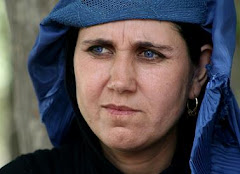Gulnaz prompted an international outcry in 2010 when she found herself jailed for adultery after being raped. But in the three years since then, her life has taken an even more shocking turn.
She lives on the outskirts of Kabul, in a new neighborhood that, translated, means "cheap and expensive". Her days, like most Afghan housewives, are filled with cooking, baking bread and childcare.
Yet Gulnaz is no ordinary housewife. For a time she was an international celebrity, a symbol of the suffering Afghan women are subjected to, years after the west toppled the Taliban and promised to transform women's rights.
He dishonoured me, but at least this way my daughter will have a father.
Her path to worldwide fame began three years ago, when she was violently raped by her cousin's husband in the family home.
After the attack, Gulnaz realised she was pregnant. She went to the police, but instead of getting help, she was arrested and imprisoned for adultery.
Her situation caused an international outcry. Gulnaz's story was reported all over the world. Eventually Afghan President Hamid Karzai issued an unconditional pardon.
'I had no other option'
But now Gulnaz has become a symbol of the west's failure to progress the cause of women's rights in Afghanistan.
After three years of living first in jail and then in a women's shelter, she finally bowed to pressure from her family and her society by marrying the man who raped her.
"I didn't have any other option." she told us. "My family didn't want me and I didn't have anyone else.
"In the end I had to do it. He dishonoured me, but at least this way my daughter will have a father."
In denial
In her new home in Kabul, she now lives with her new husband, Asadullah. He served two and a half years in jail for the rape. She shares the home with his first wife and their five children.
They said I raped her and tied her with a rope. Nothing like this happened. There was no force.
Asadullah says he has some regret about what happened. But he still refuses to admit he raped Gulnaz.
"They said I raped her and that I tied her with a rope and so on. Nothing like this happened. There was no force."
The atmosphere in the house is glacial. It is melted only by the presence of two and a half-year-old and half year old Muskan, the product of that rape.
Asadullah sees himself as the wounded party - newly burdened by the responsibility of another wife, and a new child.
"It's very difficult for someone who has a family to spend two and a half years in prison." He says. "It was very hard for me."
'I am nothing'
It soon became clear during our visit that within the choices available to her, Gulnaz had chosen for her daughter. As Muskan raced around the room playing with her new brothers and sisters, a grin plastered from ear to ear, the true meaning of sacrifice became clear.
"I want her to study, to have an education, maybe she will want to become a doctor or a teacher," she told us. "I want her to become something. I am nothing."
The story emerges as negotiations begin with the Taliban in on Doha. Many fear is that any of the advances women have made in the last decade will be bargained away.
Read Alex Thomson's blog - One nil to the Taliban: the flag and the farce
"The big red line that people keep talking about is, everyone says the constitution but what they really mean is the article that says men and women are equal," says Heathr Barr, Afghanistan researcher for Human Rights Watch.
"This is something it's unthinkable that the Taliban would accept. I think Karzai wants to avoid this discussion avoid this argument about how fundamentally committed to women's rights is Afghanistan going to be now and in the future."
The accompanying film is the work of Clementine Malpas and Leslie Knott. It was produced by Teresa Smith and edited by Agnieszka Liggett. The reporter is Kylie Morris.

.jpg)



